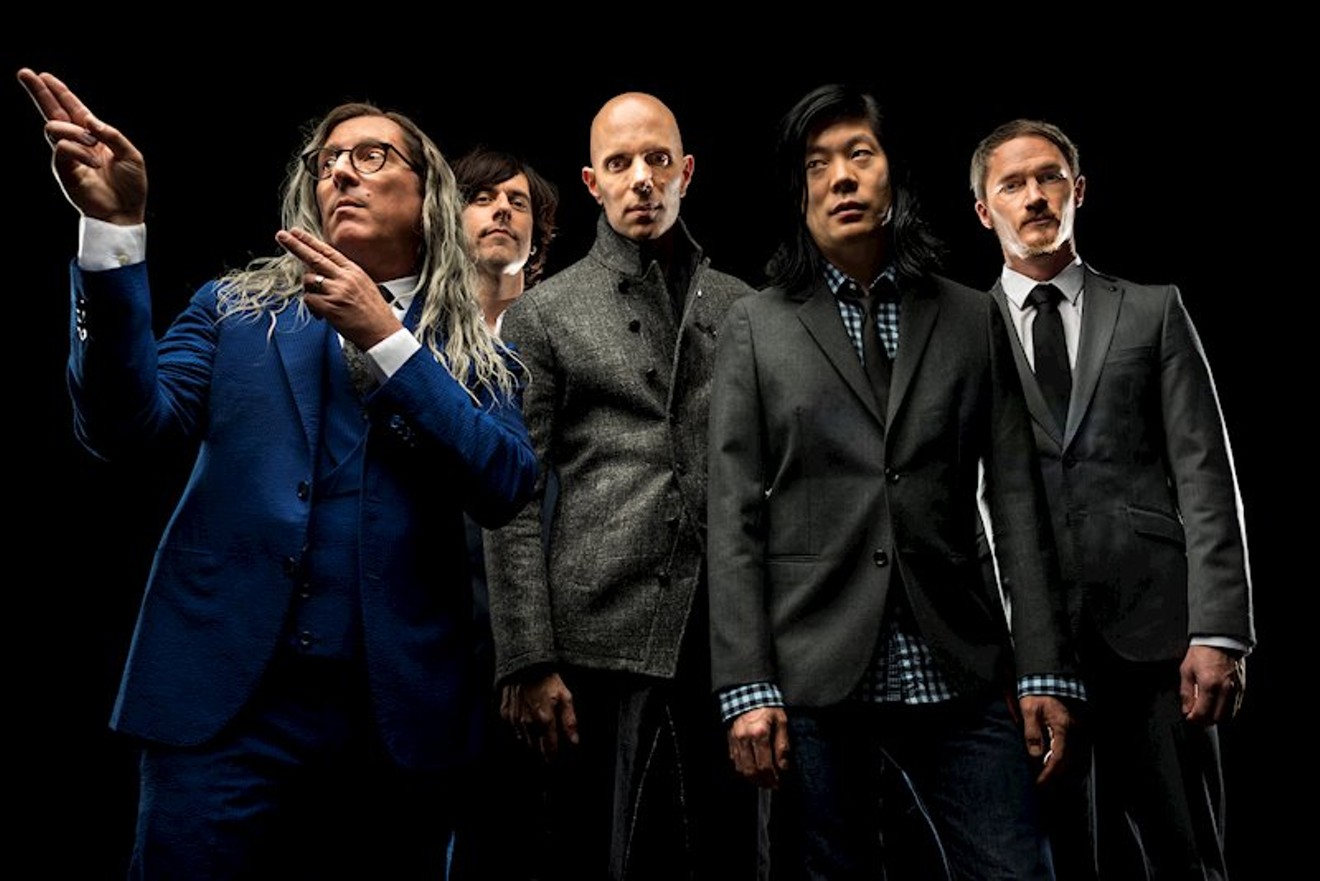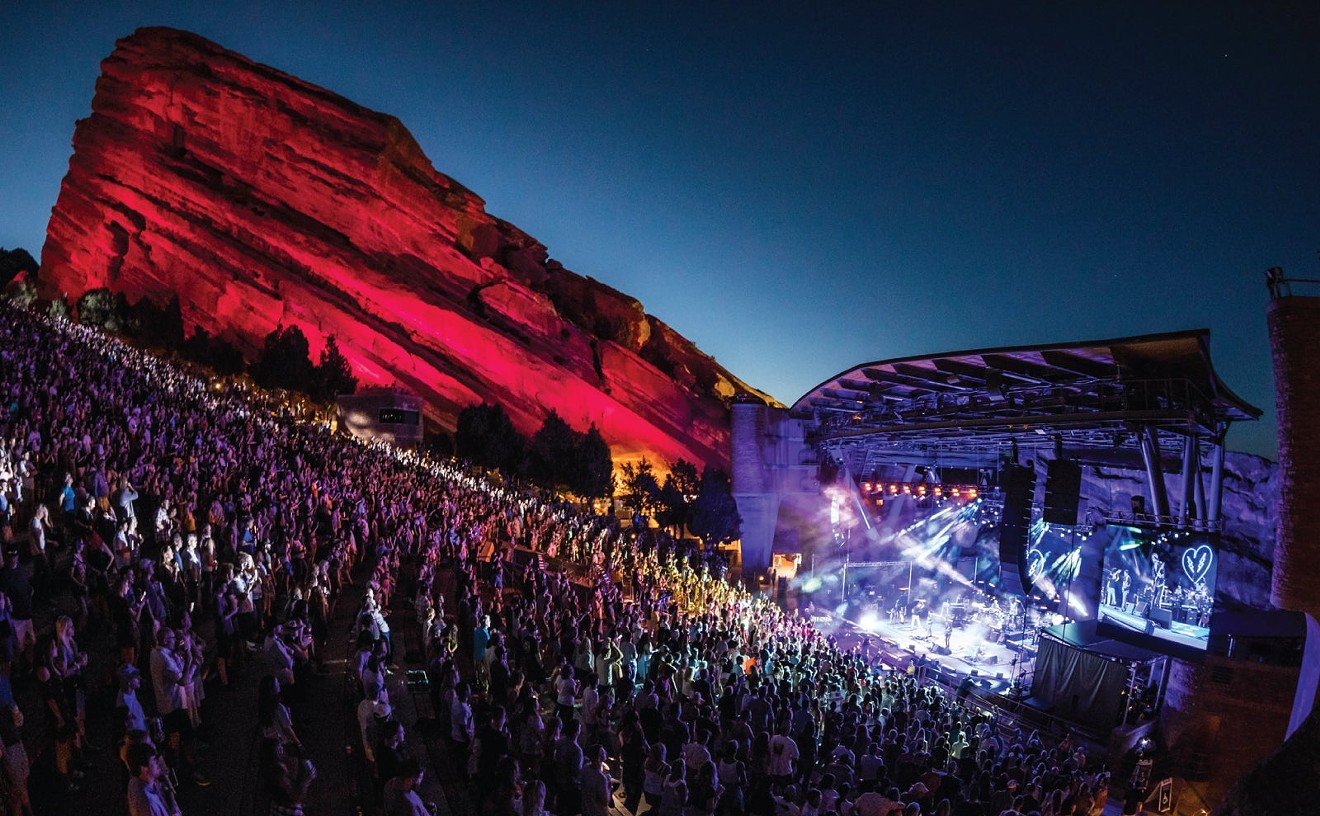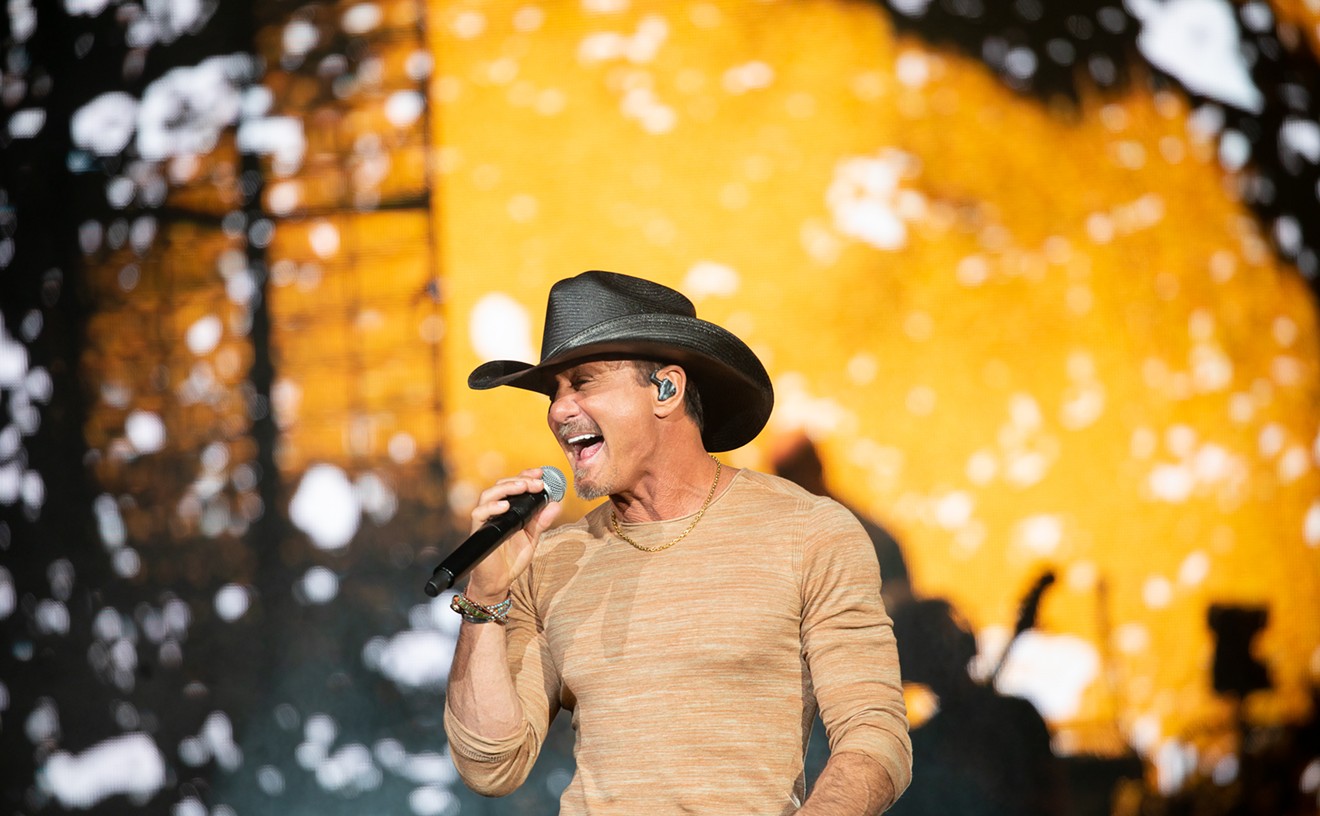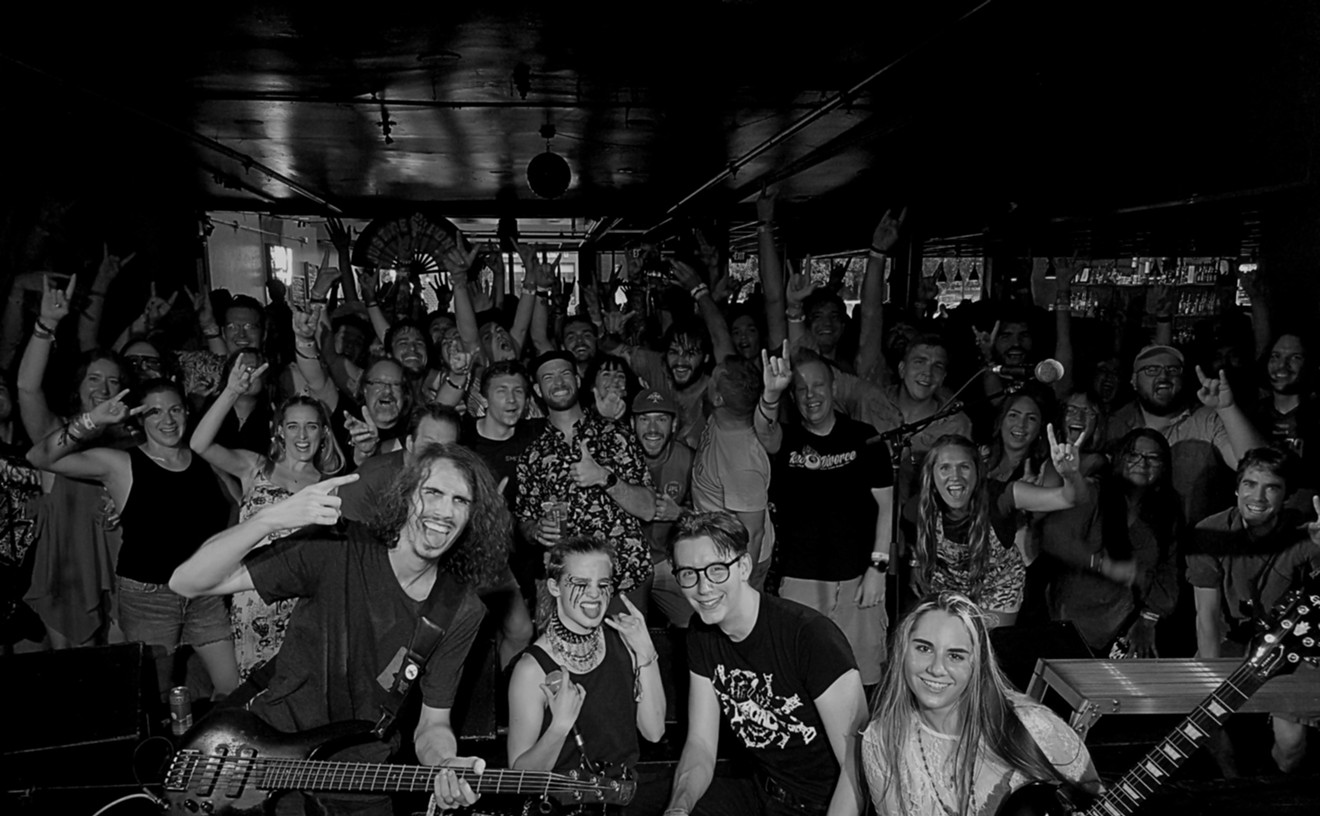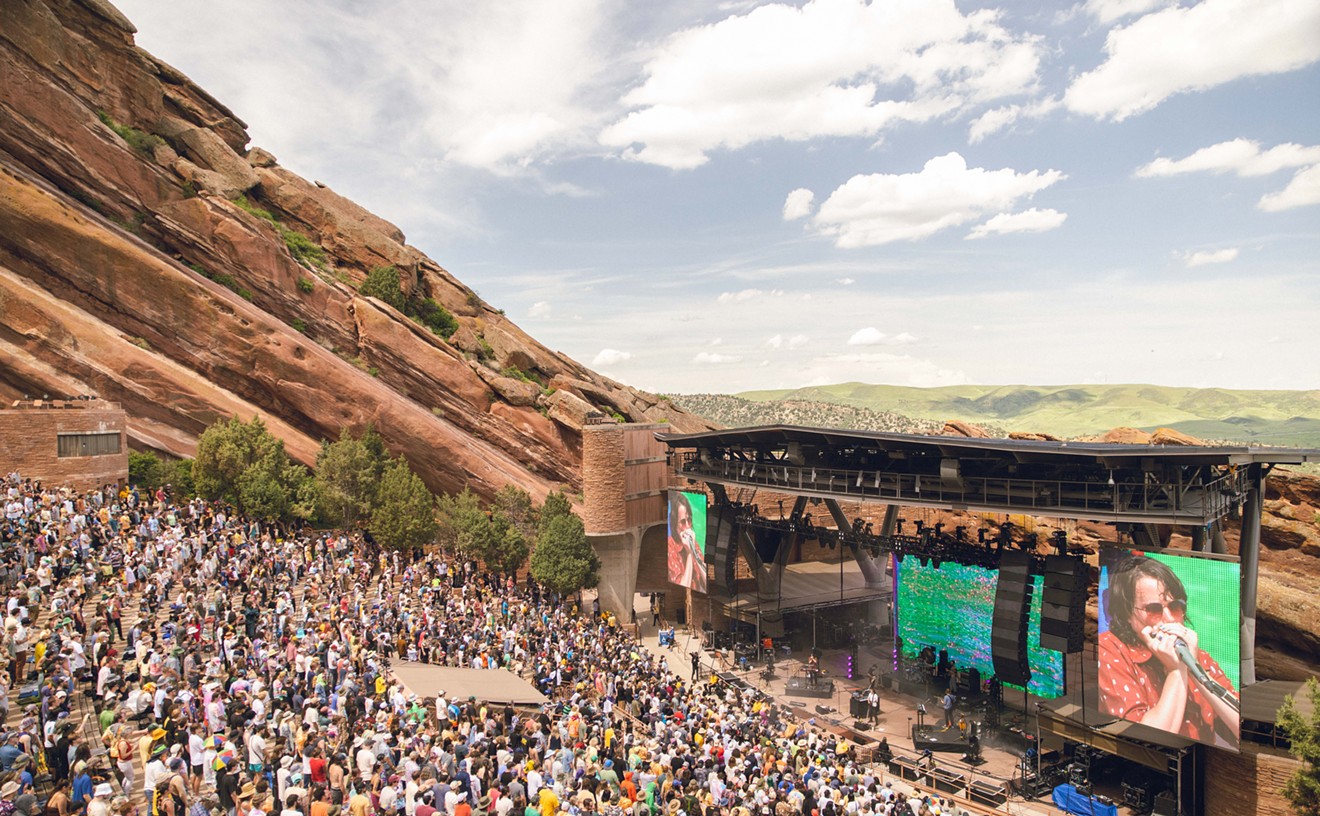If you thought early 2000s hard-rock supergroup A Perfect Circle had gone away for good, that’s understandable.
Founded in the ’90s by Tool vocalist Maynard James Keenan (who sings and writes the lyrics) and former Tool guitar tech Billy Howerdel (who writes the music and also plays solo under the name Ashes Divide), A Perfect Circle had, after all, been pretty quiet since the release of 2004’s collection of politically charged covers, Emotive.
But Howerdel was writing all along, and waiting for an opportunity to fit A Perfect Circle into Keenan’s busy schedule, both as a rock star and an Arizona-based vintner. Over the past couple years, that opportunity opened up, and Howerdel and Keenan completed Eat the Elephant for release earlier this year.
As comebacks go, it’s a good one: Eat the Elephant might just be the band’s best album yet. Across its twelve tracks, Keenan’s voice is at once graceful and powerful, his lyrics are mysteriously poetic, and Howerdel’s progressive rock is prettier and more elegant than before — a result, no doubt, of his recent film-scoring work.
Westword caught up with Howerdel recently to talk about A Perfect Circle’s fourteen-year break in between albums and what it’s like working with Keenan.
Westword: It’s been fourteen years since the last A Perfect Circle album. What did you do during that time?
Billy Howerdel: I kept working. There’s other things in life to do. I’m still writing. I’ve got a family at home. There’s lots to do. When the time came to have music together, I was prepared. I mean, I would’ve been prepared in 2014, too, but it would’ve been a different set of music. It would’ve sounded different. Every day it adjusts and changes.
Were you surprised by the songs that emerged and became A Perfect Circle songs?
There are some songs that Maynard responded to that surprised me. I played him songs that I would think would get him motivated, and then I played him a couple of tracks that were gonna be on my next Ashes Divide record, and he responded to some of those. And there were some that I played him where I told him, “This is where I’m at. Here’s where I’m holding, creatively” and he gravitated to some of those. So that’s where I kind of took my cues and went, “Okay, I’m going to finish this out.”
You’ve talked about writing music in service to Maynard’s voice and lyrics, and I find that fascinating, because rock stars tend to have egos, and it seems like you really have to set your ego aside with this project. Does that come naturally to you, or is it something you’ve learned?
I think I’ve learned over the years. Not to get too touchy-feely about it but...I meditate when I can or just kind of try and look at the big picture, and letting go of your ego is part of it, I think. And, no, that wasn’t always the case for me. Because at a certain point, I have to stand my ground and prove that I can do this. But I’m also terrified that what I’m presenting isn’t good enough. I imagine that’s pretty common. Your ego can turn you into an asshole. It can turn you inward and then never let your voice be heard. And I guess it just got to the point where I kind of established what it is that I do, and Maynard is brilliant at what he does.
You scored an independent film (D-Love) a couple of years ago. How did that affect your work on Eat the Elephant?
In writing music for the movie, you’re certainly writing in service to the movie. You are the last storyteller of this two-year process. There’s this script that the writer [has left] his ego fully intact on it. And then the director gets to reinterpret that and distills it down to what should be shot. And then the editor comes along and [decides] what works and what goes on the cutting-room floor. Then the last part of the puzzle is the composer. You’re there not to rearrange the film, but just to be in service to all that hard work that happened for so long and then create the mood. I think that’s a hard puzzle to figure out.
I kind of tried to take that approach with this record in a way, even though I’m the script writer, Maynard’s the director, and then I’m coming back in...but it kind of helped me put that in perspective and see it as a form that I could work within. It was good and it wasn’t good. It was everything. It was hard. There are certain things I want to do musically, but I have to get those out front and then let him respond to it.
Do you ever struggle with A Perfect Circle’s process? Do you ever have a hard time handing one of your songs over to Maynard for his input?
I trust Maynard’s taste so much and his talent so much, I don’t really worry about those things. I might work with someone else that I might second-guess...but I very, very rarely have that with Maynard, where I question something. I can think of, like, two songs out of forty that we’ve done that I would be like, “Eh, I’m not quite sure about this” and then right at the end, it’s like, “Okay, it’s awesome.” I always have to go on faith that this is just going to happen, and it’s not something to be concerned about. So in the end, I just have to get his best work out of him.
You worked with a producer, Dave Sardy, on Eat the Elephant, rather than producing the album yourself, as you had on previous records. What effect did that have?
With Dave, it was a collaboration of sound. We’re throwing ingredients onto a blanket, and he’s grabbing them and assembling them into a sandcastle of some sort, and then we come in and spray lacquer on it when we’re kind of satisfied — whereas in the past, I was the writer, I played most of the instruments, and then I’d engineer and pre-mix the thing. So it was more of an isolated effort, where this was more collaborative. And Maynard had a lot more input and direction and things he wanted to do on this record. In the past, he gave me a lot of rein. The first record, in particular, he was like, “This is your project.” And he provided an amazing voice and amazing words to my music. And that was great, but I look at this one like it’s his record in a way. I mean, obviously we worked on it together, but I feel like this was his final vision as to how he wanted it to sound.
Did that surprise you? Or was it something you expected?
I felt it going there, to be honest. I’ve not even talked to him about it. It’s one of those things that I’ve planned on us talking about, but a lot of things, we just don’t ever speak about. A lot of things go unspoken. I’ve known him for a long time. We know how each other work. We can respect each other, frustrate each other. We know how to get out of a situation to make something move forward, and that’s kinda part of the [mystery]. Because our communication isn’t always so direct, we’re not playing therapist with each other on the process. I’ve seen that happening with other artists before. There’s a little more first-date mystery going on.
A Perfect Circle, with Tricky and Night Club, 7:30 p.m. Monday, October 22, Red Rocks Amphitheatre, 18300 West Alameda Parkway, Morrison, $39.50-$79.50.
[
{
"name": "Air - MediumRectangle - Inline Content - Mobile Display Size",
"component": "12017618",
"insertPoint": "2",
"requiredCountToDisplay": "2"
},{
"name": "Editor Picks",
"component": "17242653",
"insertPoint": "4",
"requiredCountToDisplay": "1"
},{
"name": "Inline Links",
"component": "18838239",
"insertPoint": "8th",
"startingPoint": 8,
"requiredCountToDisplay": "7",
"maxInsertions": 25
},{
"name": "Air - MediumRectangle - Combo - Inline Content",
"component": "17261320",
"insertPoint": "8th",
"startingPoint": 8,
"requiredCountToDisplay": "7",
"maxInsertions": 25
},{
"name": "Inline Links",
"component": "18838239",
"insertPoint": "8th",
"startingPoint": 12,
"requiredCountToDisplay": "11",
"maxInsertions": 25
},{
"name": "Air - Leaderboard Tower - Combo - Inline Content",
"component": "17261321",
"insertPoint": "8th",
"startingPoint": 12,
"requiredCountToDisplay": "11",
"maxInsertions": 25
}
]

